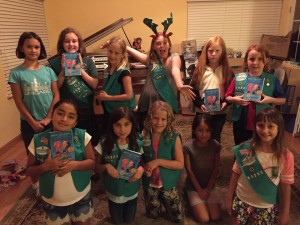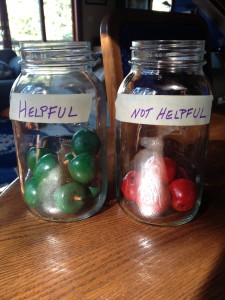|
|
November 7, 2015
 We’ve got the tools and we’re brave enough to use ’em! Last month I began partnering with the Girl Scouts of Northern California by presenting my Girls Friendship without the Drama Workshops. In the first hour I teach girls to navigate all kinds of sticky peer conflicts while the moms (and the few cool dads who’ve shown up) sit back, listen and observe. During the second hour the girls skedaddle into another room where they engage in more (supervised) friendship-building skills while the parents and I circle the wagons and get to the heart of what girls need from those of us who love them.
To date I’ve done nine of these workshops with another seven scheduled. Girls can’t wait to start using what they’ve learned. Moms are reminded how painful it can be feel “replaced” by a friend. Dads are stunned at how hard it is for girls to tell a friend, “Stop. I don’t like that.” Parents are thrilled to have new insight, language, and context to help their daughters do a better job navigating friendships.
Here are some tips to help you help your daughters and sons resolve the inevitable issues that come up between our kids and their peers.
Dealing with Friendship Challenges
- Calm Down. No matter what awful thing some child has done to your daughter or son, calming down first makes it easier to get through the upset. So take some slow deep breaths and encourage your child to do the same.
- Show that you get it. Acknowledge that it hurts when a friend turns against you. Reflect back what you hear, “You sound really hurt, angry, and confused.” Share one of your own “hurt by a friend” stories. Share what you learned and how you used it to become a more thoughtful person and a better friend. This models empathy and reassures your child that (s)he will survive.
- What Can/Can’t You Control? Tell your child, “You can’t control a friend’s behavior or feelings, but you can get a handle on your own.” When we try to control things we can’t control, it stresses us out and makes us feel powerless. Don’t let your kid go there!
- You’ve got options! Even after a blow-up with a bff, your child is far from powerless. She always has options. For example, your child might:
- Never talk to that friend again
- Get back at her by spreading gossip
- Suppress the hurt and act like it didn’t bother you
- Find new friends
Brainstorming should be open-ended. Encourage your child to freely explore ideas without your judging them. They’re just ideas and this is a clearing process. Even the worst, knee-jerk options offer great (and totally safe) learning opportunities. In addition, you’ll give your child a gift by talking about all of this. When s/he doesn’t have to worry about your rushing in to “fix” the problem, your child’s thinking process will be accelerated. Hopefully, she’ll move closer to the time when she no longer accepts disrespectful behavior from anyone, including herself!
At the end of the process your child may decide to take a vacation from the drama or to find the EXIT out of the friendship. That’s her choice. But just because she’s finished, doesn’t mean she has the right to make life unhappy for an ex-friend. I put it is this way: You have the right to choose your friends, but it’s NEVER okay to be cruel or disrespectful. Keep your distance if you choose, but always treat others the way you want to be treated. Old rule. Still applies.

October 28, 2015
 Forever may be shorter than you think The emails from girls who have been “dumped” by a BFF and “replaced” by their ex-BFF’s new BFF continue to pile up. I get several every day. And while it’s normal to feel upset when the person you’ve been closest to no longer gives a fig for your friendship and it’s helpful to reach out to someone you can trust, you’ve got to ask yourself: what can I do besides feeling like crap?
If you’re a teen, this one’s is for you. I’m going to tell you how to use your power in ways that will make you feel good about yourself… not like the “thrown out pickle on a hamburger” (as one 13 year old so eloquently put it.)
If you’re the parent of a teen, this one’s for you too because even when your girl feels “helpless” there are ways you can help her through this rejection.
Hey Terra – My BFF and I have been really close for 3 years. Last year I became close with another friend. I treated them both like my best friends and I had no idea my first BFF was kinda jealous of the other, she never told me. I felt her drifting away. Then she started getting close to a newcomer and calling her her best friend! I felt replaced. I am getting jealous and I really wish I can have my best friend back. It hurts everytime I see their pictures together. They are always hugging each other and holding hands, which I dislike because she never did that with me. It really hurts at the moment because I can feel my friend ignoring me. I feel so lost Terra, please help me. – Lost and Hurting
Dear Lost and Hurting,
It’s not easy to feel “replaced” in the heart of someone you really care about. I’m sorry you’re hurting. Maybe I can help.
I think it’s interesting that the first half of your email describes the feelings of jealousy your friend experienced when you got close to the other girl. You are intelligent and you’ve probably already noticed the situation has flippednow you’re feeling the same way she did!
The question to be answered is: What can you do about this?
You cannot control your friend’s feelings or thoughts or behavior. If she wants to spend more time with the other girl and if she wants to call the other girl her best friend, you have no control over that. But you do have control over how you respond from this moment on.
If it hurts or makes you jealous to look at their pictures then don’t look. Stop hurting yourself this way. Choose to stay away from her FB page or Instagram or whatever. Likewise, if you feel jealous when you see them hugging each other then stop following them with your eyes. And if you see them, by chance, look away. These choices are within your power.
You don’t say how long this has been bringing you down. I hope not too long. You can choose to continue feeling sad, jealous and rejected if you want to. I wouldn’t recommend that! Instead, I’d recommend that you think about new friends. Start with a list where you fill in the blank to complete this sentence: “I want a best friend who is—————.” Think about all the qualities you are looking for in a close friend. Are you looking for friend who is as intelligent as you are? A friend who shares your values and interests and sense of humor? A friend who wants to be with you as much as you want to be with her? Make a list and then go shopping for a new friend. And be patient. Sometimes it takes a while to find a quality friend.
I hope this helps.
In friendship,
Terra

September 16, 2015
 Was that really helpful or not so much? Imagine two empty glass jars. One labeled Helpful. One labeled Not Helpful. Imagine each time you say something to someone (online or off) you must put a marble in one jar or the other. By the end of the day which jar has more marbles?
Getting along with each other has always been a major challenge on this planet. Each day, each of us has the power to increase hostilities or increase feelings of friendship and cooperation at home, at school. Everywhere. It’s really that simple.
Think about the two jars with this hypothetical situation:
A group of kids sit at a lunch table with one empty seat. A new kid comes over carrying a lunch tray and asks “Can I sit here?” For each choice, which jar gets a marble, Helpful or Not Helpful?
Someone says “No way!” H or N
New Kid throws a french fry at someone. H or N
Someone lies and says, “Sorry, but I’m saving this seat for my friend.” H or N
New Kid lies and says, “No problem.” H or N
New Kid says, “I don’t want to sit with you. You’re mean.” H or N
Someone says “Sure” and makes room. H or N
Someone frowns but doesn’t move. H or N
Someone quickly puts her sweater on the empty seat. H or N
Someone says, “No weirdos at this table.” H or N
Someone laughs. H or N
Someone feels bad, but says nothing. H or N
Someone says, “Don’t be mean. Let her sit with us.” H or N
Someone whispers, “Why can’t she sit here?” H or N
Someone shrugs and says nothing. H or N
Someone pretends to text. H or N
Someone from another table and invites New Girl to sit with them. H or N
Now count your marbles. How many in each jar? What would you personally do in this situation? Not sure? That’s honest. Think about it some more. I understand this isn’t an easy question. Talk to your children. Your partner. Encourage your kids to talk to their friends. Share the idea of the two jars with them. We all agree that everyone wants to be treated with kindness and respect. That’s so clear. But when it comes to how we treat others, moment to moment, not so clear. Which jar are filling up today?
NOTE: I’m leading a series of Girls’ Friendship Without the Drama Workshops for the Girl Scouts and anyone else who wants to get a group of 15+ together to learn to be more helpful.

July 30, 2015
 What’s wrong with you? Can’t you take a joke?! For better or for worse, our tweens and teens spend immeasurably more time with their friends than we did at their age. UOK wid dat? If we allow it, digital access enables them to connect every waking hour. These interactions strengthen interpersonal skills as often as they undermine them. Our kids must learn to set boundaries with other kids so they’ll develop confidence in who they are and what they need in a relationship.
Today’s question comes from a parent whose 10-year-old daughter has two challenging friendships.
Friend A says things to my daughter that undermine her confidence (“Everyone knows your writing sucks.”) but then laughs it off as a joke. Friend B is very sweet and kind, but too clingy. She always wants to do whatever my daughter does. Are there phrases she could use to help her tell the bitchy chick to change or go away, and to tell the lovely friend to be more independent?
– Frustrated Mom
Setting boundaries is something we all have to learn, because we need to teach people how to treat us. When we stay silent in the face of insults or we laugh along with the people mocking us, we send this message: “It’s OK for you to put me down.” Since that’s not the message your daughter wants to send, she needs to speak up for herself.
When Friend A makes nasty comments then hides behind “Just kidding!” your daughter needs confidence to let the girl know she just “crossed the line.” Ah, but how?
Many girls equate challenging a friend with being “mean” and that’s part of the reason they avoid “confrontations.” Make sure your daughter understands this isn’t a confrontation, it’s a respectful communication. Let her also know that standing up for herself (or others) doesn’t make her “mean” it makes her brave.
Advise your girl to stay calm and strong while she makes eye-contact, and simply speaks the truth. She might say something like this to Friend A: “That didn’t feel like ‘kidding’ to me. It hurts. If you’re really my friend, you won’t do that again.” Now Friend A has been put on notice and your daughter has taken back her power. If your daughter needs help saying these words, role play with her until she feels ready for the conversation. Hopefully this will work. If Friend A continues to make cutting remarks, then your daughter will have to continue standing up for herself and/or find the EXIT to this friendship.
In the case of “too clingy” Friend B… that’s a bit trickier. Your daughter has the right to choose who she spends time with but she doesn’t ever have the right to intentionally hurt anyone. (Remind her how it feels to be on the receiving end of one of Friend A’s zingers.) But that doesn’t mean she must continue to allow herself to be smothered in her clingy friend’s embrace. She might say something like this to Friend B: “I like spending some time with you but not all the time. I want to spend time with other friends, too. So today, let’s hang out together during lunch recess. Then tomorrow I’m going to hang out with Friend C.” That’s a clear communication and it is sensitive and respectful. Friend B may not be happy to hear that she won’t be with your daughter tomorrow, but if your daughter stays calm and delivers the message clearly and confidently, Friend B will (eventually) figure out that she needs to widen her friendship circle.

| |















